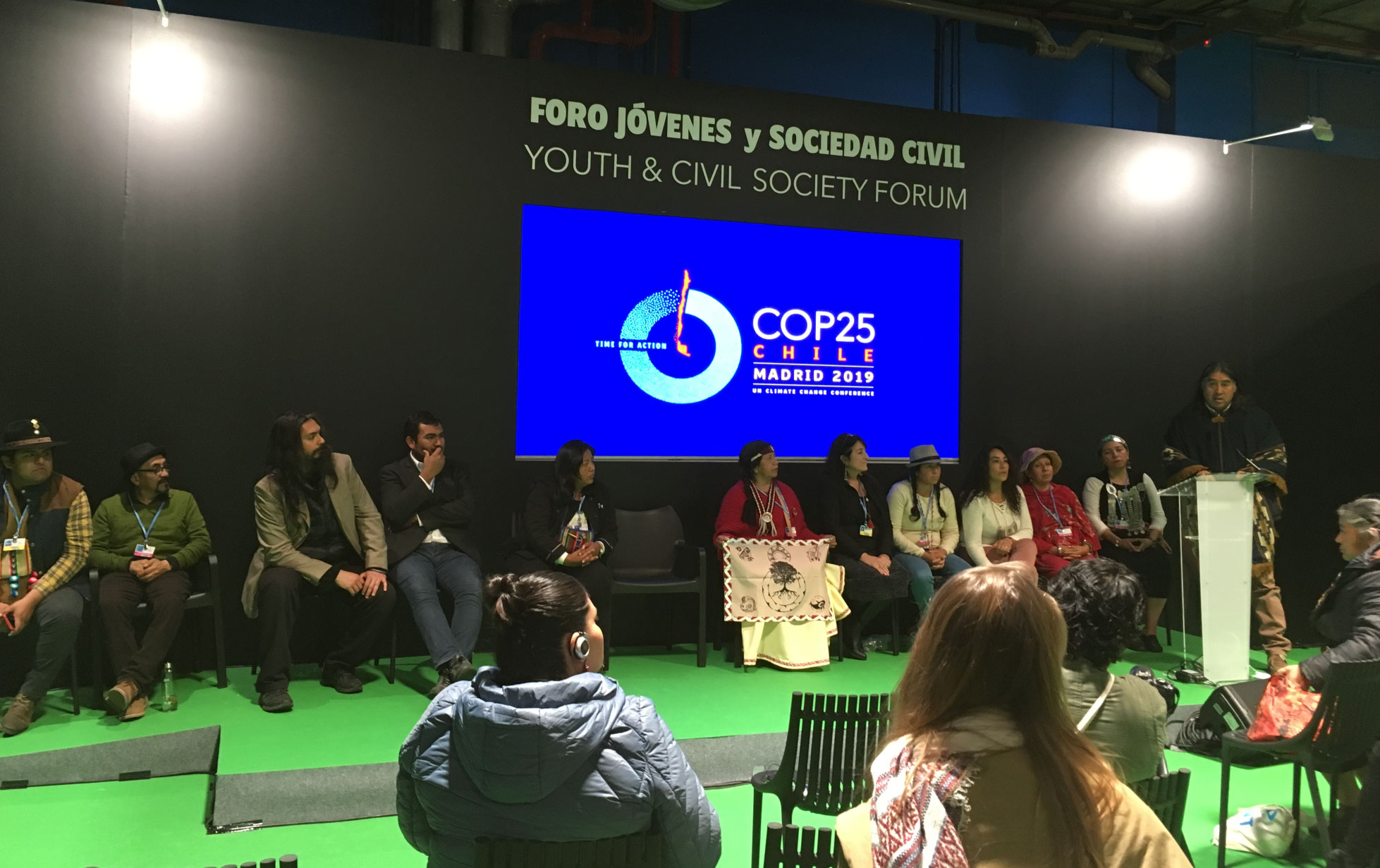Despite decades of meetings, the effects of climate change are worsening year on year. Temperatures continue to rise, droughts are more severe, and extreme and unpredictable weather events are occurring more frequently. These impacts disproportionately affect Indigenous Peoples who, paradoxically, contribute the least to this phenomenon. We must insist on the importance of climate justice and the central role of Indigenous knowledge in global climate policy discussions.
International meetings have been happening for over three decades and yet there is still a feeling that we have not moved forward. Just this year, as one of the meetings under the United Nations Framework Convention on Climate Change (UNFCCC) was happening, a flood of catastrophic proportions devastated the state of Rio Grande do Sul in Brazil, leaving 85% of the state affected, including the state’s capital. Simultaneously, Kenya suffered consequences from floods, affecting the capital Nairobi as well as the National Park and Maasai land, the Maasai Mara.
The mismanagement of responses and policies in each country exacerbated the situation. The capital of Kenya sits on top of the Nairobi River’s floodplain and, although the Meteorological Department expected worse flooding in 2024 than previous years, not development of infrastructure followed. And the federal government failed to alert citizens, a situation that was exacerbated by the continued dismantling of environmental laws.
Similarly, the volume of water that fell in the south of Brazil was abnormal but expected in predictions. Nevertheless, since 2019, the state government of Rio Grande do Sul has disassembled environmental laws, proposed a “modernized Environmental Code”, and facilitated the deforestation of previous protected areas for the expansion of cattle rearing. Because of this, there was no possible outflow for the Rio Guaíba, which crosses the whole state.
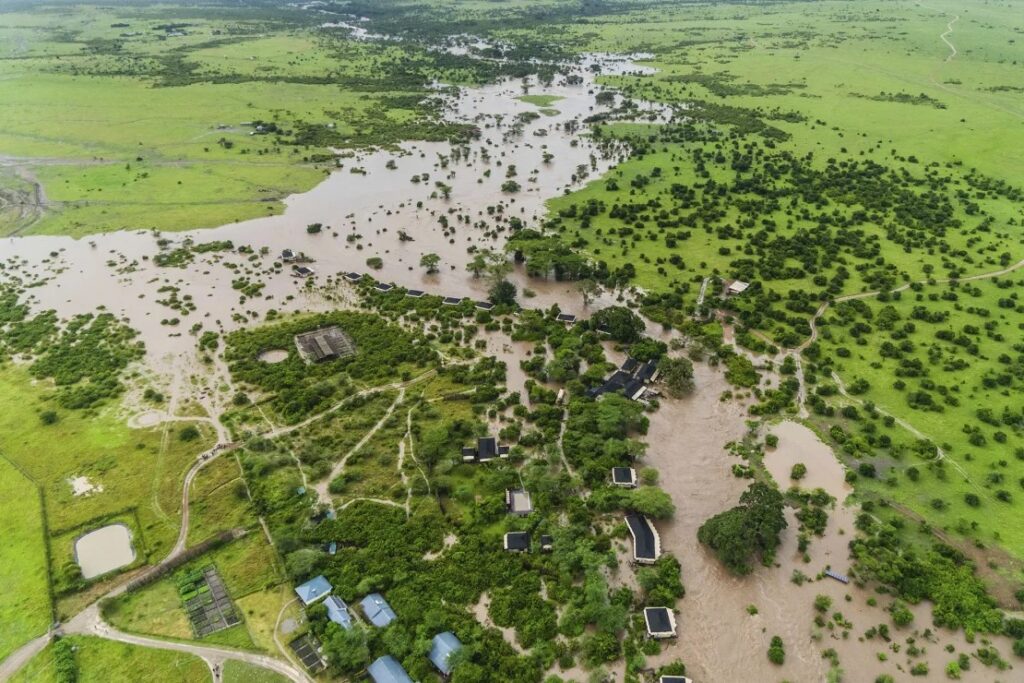
Who is responsible for climate change?
As these events happen and the effects of climate change scale up, the idea of a climate catastrophe and the end of the world is building up in the media and international spaces, led by the United Nations. The destruction of life as we know it strengthens the sense of urgency to act that is demanded by Indigenous Peoples, environmental activists, and scientists. And yet, the bureaucracy of international environmental forums runs slow.
In 1988, a conference entitled “The Changing Atmosphere: Implications for Global Security” gathered atmospheric scientists from around the world together to bring awareness of changes in climate patterns and, more importantly, showcase predictions of how these changes would affect life on a global scale. The meeting was considered the “first global consensus” that this will be an era of unprecedented climate change, and that this is caused by human action.
Over the years, international activism has managed to open the COP up to civil society and the presence of Indigenous Peoples has increased. The influence of the oil industry has, however, also strengthened.
Over the years, international activism has succeeded in opening the COP up to civil society and the presence of Indigenous Peoples has increased.
So when we talk about urgency and environmental catastrophe caused by human action, who exactly is responsible? Climate justice questions how climate change has affected different people in different ways and on different timescales. It also challenges the notion of “human action” as a vague cause of climate change, instead pinpointing specific practices and histories. One key example is the situation of Indigenous Peoples, who have continuously suffered the destruction of their territories, the dispossession of their lands, and relocation. Meanwhile, colonialism sustained the development of industrialization in the Global North and the expansion of fossil fuels. Paradoxically, without having contributed significantly to climate change, Indigenous Peoples are now suffering the most from its impacts.
The varying degrees of urgency and framing of the causes of climate change are present within the UNFCCC and the multiple groups of people engaging in these spaces. Over the years, international activism has succeeded in opening the COP up to civil society and the presence of Indigenous Peoples has increased. However, the influence of the oil industry has also been strengthened. In fact, the last Conference of the Parties (COP 28), which had the largest number of attendees, was held in one of the world’s main oil capitals: Dubai.
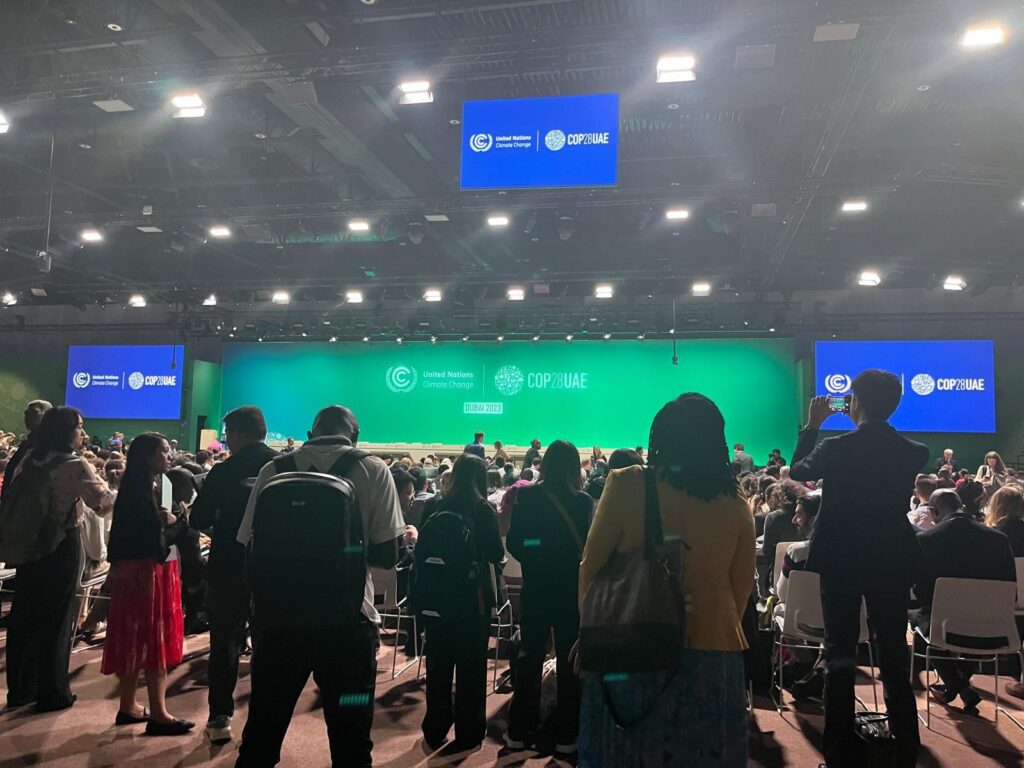
Thinking international climate governance
The purpose of UNFCCC meetings revolves around the construction and negotiation of documents by signatory countries, referred to as “Parties”. This is a state-focused process, whereby Parties have to reach a consensus on mitigation and adaptation actions. The signatory countries are the only ones that have the power to approve or reject the final wording in the negotiated documents and have the most access to the negotiation rooms. Most Indigenous delegates participating in these events have “observer status” similar to civil society organizations.
Indigenous Peoples have a differentiated set of rights guaranteed by the UN Declaration on the Rights of Indigenous Peoples. Indigenous international activism has fought and guaranteed protection and respect for Indigenous rights since, historically, nation-states have committed acts of genocide, exploitation, and dispossession of Indigenous lands. Through the international arena, Indigenous Peoples have gained space to not only raise and denounce nation-states’ actions against Indigenous lives, practices and territories but also to actively advocate for the equitable inclusion of Indigenous voices and Indigenous knowledge in global discussions about climate change.
The Paris Agreement indicates that adaptation should be guided by the best available science and, as appropriate, traditional, Indigenous and local knowledge.
The Paris Agreement indicates that adaptation should be guided by the best available science and, as appropriate, Indigenous and local knowledge.
Indigenous Peoples have a distinct categorization within the UNFCCC as a “rights-based” constituency, along with two others: “youth” and “women and gender”. The important role of Indigenous Peoples in combating climate change has slowly been recognized in international climate discussions. Indigenous knowledge and practices must be considered within a process of their free, prior and informed consent, and Indigenous participation at this global level is essential to monitor how Parties will enact climate policy at national and regional levels.
In 2008, the UNFCCC recognized the International Indigenous Peoples’ Forum on Climate Change, a body that acts as the caucus for Indigenous Peoples with a mandate to agree on what Indigenous Peoples will be negotiating. In 2015, the Paris Agreement came into force, recognizing for the first time in a UNFCCC document the need to respect the rights of Indigenous Peoples and that the Parties must consider how adaptation action affects them. Furthermore, the Paris Agreement indicates that adaptation “[…] should be based on and guided by the best available science and, as appropriate, traditional knowledge, knowledge of indigenous peoples and local knowledge systems.”
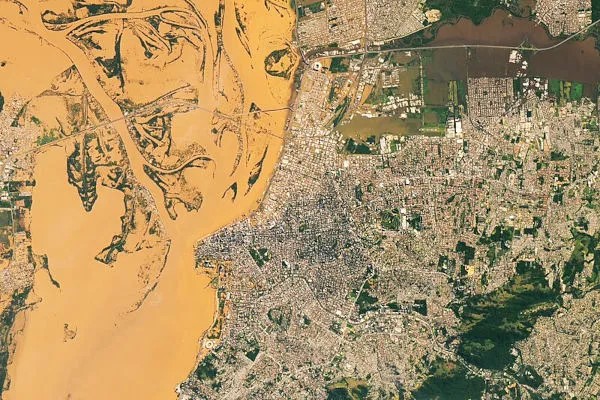
A platform for Indigenous Peoples’ participation
Aligned with the Paris Agreement, in 2015, the Local Communities and Indigenous Peoples Platform (LCIPP) was created to address the specific needs of Indigenous Peoples and propose mandated events in dialogue with the Parties. Concretely, the COP decided that it: “Recognizes the need to strengthen knowledge, technologies, practices and efforts of local communities and indigenous peoples related to addressing and responding to climate change, and establishes a platform for the exchange of experiences and sharing of best practices on mitigation and adaptation in a holistic and integrated manner.”
Between 2016 and 2018, negotiations mediated between the International Indigenous People’s Forum on Climate Change, the UN, and the Parties continued to establish the purpose, content, and structure of the LCIPP. The establishment of the Facilitative Working Group (FWG), as a constitutive body under the UNFCCC in order to further operationalize the LCIPP, was decided in 2018 during COP 24. Its goal is to facilitate the implementation of three functions: knowledge, capacity for engagement, and climate change policies and actions. The FWG collaborates with other bodies within and outside the UNFCCC to enhance the actions of the LCIPP under the UNFCCC.
Despite progress, Indigenous Peoples still face many barriers to their effective participation, and few Parties are committed to supporting them.
Despite progress, Indigenous Peoples still face many barriers to their effective participation, and few Parties are committed to supporting them.
The Local Communities and Indigenous Peoples Platform is currently implementing its second three-year workplan. It holds regional gatherings and an annual meeting in conjunction with the COP, develops Indigenous curricula and materials, promotes annual training workshops, and facilitates multi-stakeholder dialogues. The Facilitative Working Group therefore works as a liaison implementing the LCIPP and promoting a better institutional inclusion of Indigenous Peoples in the UNFCCC negotiations.
Despite these advances, Indigenous Peoples still encounter many barriers to their effective participation, and few Parties are committed to supporting them. For example, one of the activities carried out by the FWG during COP 28 in Dubai was a meeting between Indigenous knowledge holders and the Parties. It aimed to construct a space in which Indigenous knowledge holders from around the world could share their practices, knowledge, and challenges in relationship to water and then share a report with the Parties to showcase Indigenous voices in matters related to climate change. While the dialogue was rich, diverse and substantial, the subsequent meeting was sparsely attended by Party delegates who were already known allies or had had some level of dialogue with the LCIPP.
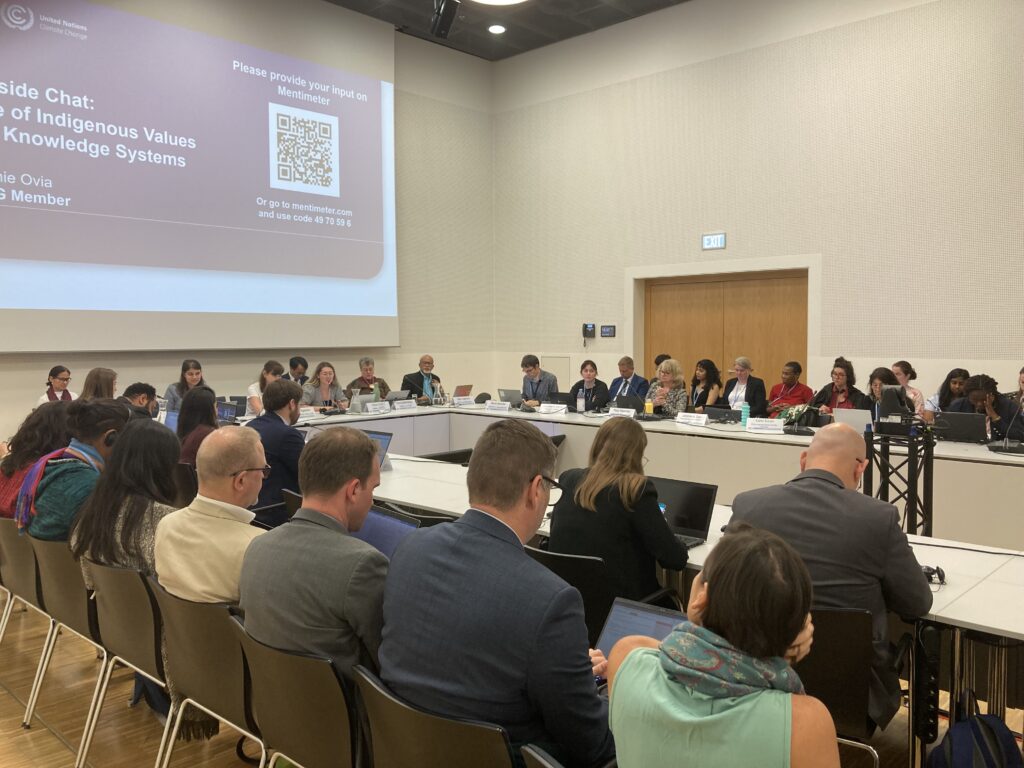
Challenges to addressing climate change
Scientific work, considered a reliable measure for predictions, mostly comes from atmospheric and natural scientists. The global scale of climate change combined with the nature of scientific predictions has abstracted the problem in a way that is difficult to align with the lived experience of its impacts. Knowledge construction over climate change has been limited to the natural and atmospheric sciences although, just recently, after more than 30 years, social scientists did contribute to the last IPCC report.
However, Indigenous and traditional knowledge remains excluded from global assessments on climate change due to the very nature of global climate policy and knowledge building. IPCC reports can only consider peer-reviewed journals, i.e., papers reviewed and accepted by the scientific community. The wide and profound knowledge shared by Indigenous communities around the world is accordingly excluded from international discussions on climate change. Indigenous knowledge should nevertheless be treated with the same authority as non-Indigenous scientific production.
Why continue to participate in the UNFCCC? The Parties and fossil fuel companies will continue to participate. If we are not there as Indigenous Peoples, environmental activists, women and youth, they will continue to exert their influence over the COP and territories.
If we are not at the UNFCCC as Indigenous Peoples, environmental activists, women and youth, the Parties and corporations will continue to exert their influence.
Although institutional changes have occurred, they are still limited. The nature of such conferences depends on the willingness of the Parties to address climate problems with the seriousness and emergency that is felt on the ground by Indigenous Peoples. The slowness of the process, the need to rely on the Parties’ willingness to listen, and structural challenges to participation are barriers against the full participation of Indigenous Peoples.
So why continue to engage with the UNFCCC? The short answer is that the Parties and fossil fuel businesses will continue to engage in the process with a substantial amount of influence and means. If we are not there, as Indigenous Peoples, environmental activists, women, and youth, they will continue to exert influence over the COP and, through it, over the territories. The actions taken at the level of the UNFCCC have a direct impact on multiple levels. In other words, and rephrasing a sentence I heard in the hallways of COP: “If you are not at the table, you are on the menu.”
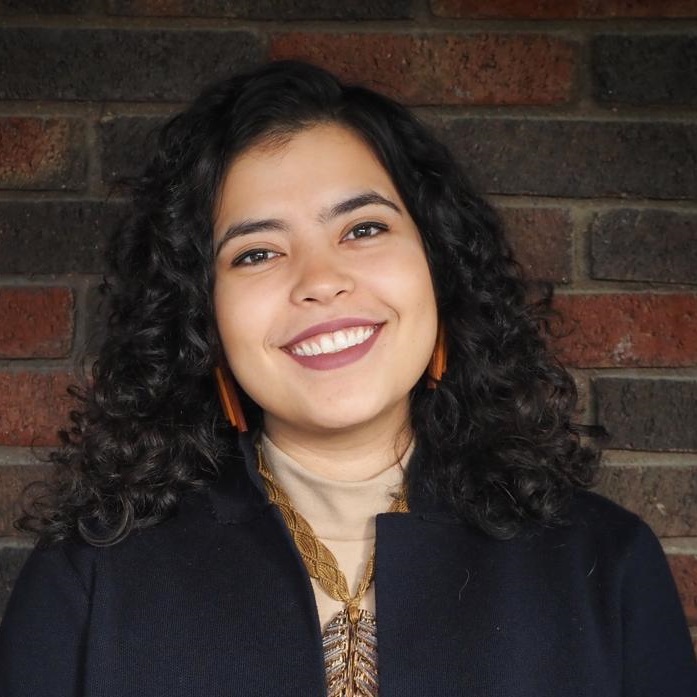
Beatriz Lima Ribeiro is a Brazilian anthropologist and a PhD candidate in Sociocultural Anthropology at Indiana University, USA. She has been attending United Nations Conferences on Climate Change and Biodiversity and, in partnership with Indigenous delegates, has been mapping the history of Indigenous participation in the UNFCCC and CBD.
